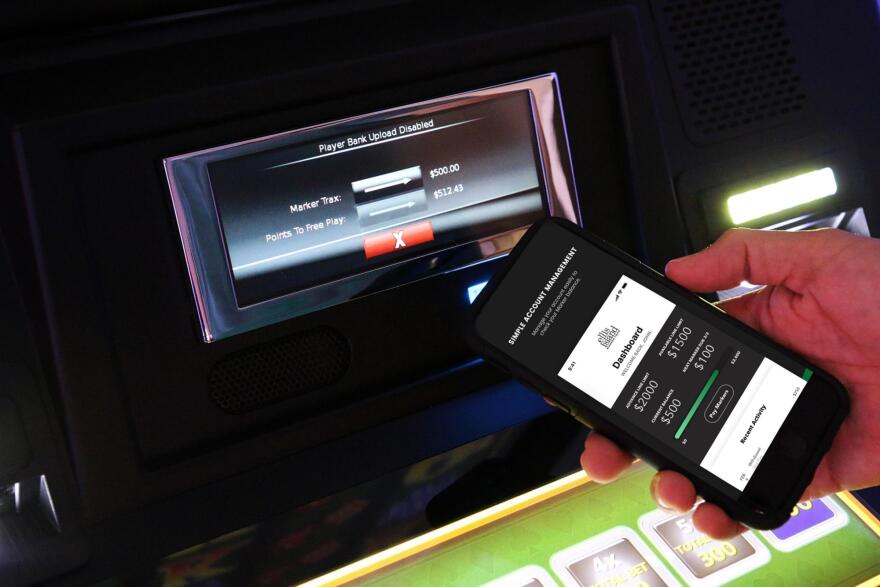Gaining credit at Las Vegas casinos has been around as long as the Strip. But as technology changes, so does the way in which gamblers borrow money from the house.
Ellis Island casino — with the help of gaming tech companies — came up with a way for its players to establish a line of credit at its slot machines and tables. And all a player needs is the casino’s loyalty player card.
Gary Ellis owns Ellis Island and he's the creator of the Marker Trax technology. He explained that players simply need to go online or to a designated kiosk or download an app. From there, they apply for casino credit - otherwise known as a casino marker - and when they're approved, they can download that credit and use it at the machine.
The process is different from the current process where those seeking a marker go to the cage or the casino host. It can take days or weeks to get the marker approved.
"You have a host or casino management that determines a line of credit," Ellis explained. "Then the casino is allowed to issue that credit, allow that credit and let that player play."
That system of markers has been around since gambling began, and it was mostly used for table games. Ellis said now that the majority of gambling is done on slot machines. They started the first trial there.
In the past, the casino host or manager likely knew the customer and if he or she was good for the credit. Ellis said this is a better way of doing business.
"It does a soft pull on credit so that you better know if a person were to have a problem, have credit history problems - that is certainly not who we are catering to," he said.
It’s been well-received by both the gaming industry and players, especially in the era of COVID-19. But it does raise the question: Does its convenience make it easier for gamblers to go deep into debt?
Alan Feldman is a distinguished fellow in responsible gaming at UNLV. While some people may think the new technology would make it easier for people with a gambling problem to fall further into debt, he believes it will actually help.
Feldman added that in the past, decisions about credit were made on scant information, but Marker Trax, and other new technologies that casinos and state gaming regulators are now using, changes that.
"We're not just giving money to people so that they can keep on gambling," he said, "We're giving money to people that can afford to pay, who are making their own judgment about how they want to spend their money."
Ellis said he and his tech partners consulted with Feldman while creating the new system to make sure it wouldn't make things worse for problem gamblers. People with a gambling addiction is not the audience he wants to target.
"This is designed for people who enjoy gaming and don't get hurt by gaming," he said, "Gaming is fun."
Ellis also pointed out that if someone is approved for a $500 line of credit, the player always gets to choose how much they will actually use. He or she can set a limit of $250 dollars, not the entire $500.
Casinos don’t reveal how much they issue in credit. But according to the Nevada Gaming Control Board’s Abstract Reports, in 2000, Strip casinos wrote off some $230 million in bad debt. It fell to $178 million in 2009. And between 2017 and 2018, it dropped into the tens of millions.
Gaming historian and UNLV professor David Schwartz looked at the bad debt issue a number of years ago, using the industry rule of thumb of about 15 percent of total gaming revenue would come from credit.
"It looked like casinos might be doing a better job at not taking on bad debts than mainstream institutions like banks and credit card companies," he said. "I think any time you have that much money, there are going to be some bad credit decisions. There is going to be some bad debt."
He said historically about 1 to 2 percent of gaming revenue is bad debt.
Players don't get a credit line because they've run out of money. Schwartz said many players use it because they don't want to walk around with a lot of cash in hand.
Overall, fewer people carry cash anyway. Instead, they're using digital wallets and other cashless methods to pay for things.
"The casino industry, to a certain extent, is going to have to respond to this," he said. "The casino industry can't stand there saying, 'We're still going to be a cash business,' if cash is going away."
Feldman said his colleagues at UNLV have launched a collaborative research project to look at how the move from cash is going to impact casinos, and the policies that will be needed to address that shift.
As for Marker Trax, Ellis said the six-month field trial required by Nevada gaming regulators is done, and one of the systems they were working with, Konami's SYNKROS, has been approved and is now out of the field testing stage.
Gary Ellis, owner, Ellis Island casino; Alan Feldman, distinguished fellow, UNLV; David Schwartz, gaming historian and professor; UNLV.










